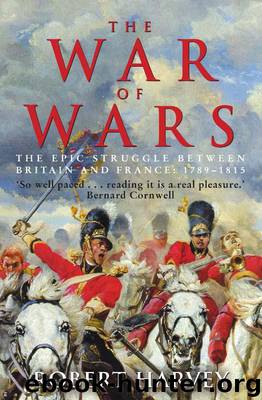The War of Wars by Robert Harvey

Author:Robert Harvey
Language: eng
Format: mobi, epub
ISBN: 9781849012607
Publisher: Constable & Robinson
Published: 2013-07-26T20:41:11+00:00
Chapter 51
THE GRENVILLE INTERLUDE
When Pitt died at the end of January 1806, William, Lord Grenville, Pitt’s brilliant cousin, formed the Ministry of All Talents, so named for its dazzling array of senior political figures from all parties and its engaging liberalism. It featured such luminaries as Charles James Fox, foreign secretary until his death in September 1806, a dissolute figure in his youth who became a politician of notable calibre and Pitt’s perennial opponent; Lord Howick, who later as Earl Grey steered Britain to peaceful political reform in 1832; and, as secretary for war, William Windham, an enthusiast for a British role in South America.
Exhausted by war and with Pitt dead, the British now made a fresh attempt to make peace with France based upon an entirely new concept – not in fact dissimilar to that advocated by the Archduke Charles in Austria. France could dominate the west and centre of the European continent, leaving Austria, Prussia and Russia to contend and expand in the east, while Britain would be left with its maritime empire, possibly carving out a massive new province of this from the crumbling of the Spanish empire in South America. There had been an extensive history to this plan – and it was under Pitt’s successor that it seemed ready at last to take flight.
Britain had long played host to an extraordinary figure, Francisco de Miranda, the former French revolutionary general and self-styled Liberator of Latin America. In May 1790, Miranda, a mixture of skilled professional soldier, dreamer, poseur, man of letters, traveller and sexual obsessive, had first met William Pitt. Miranda prepared himself feverishly, drawing up an ambitious and wholly unrealistic plan for liberation. He gave a careful estimate of the colonies’ resources, and of Spanish strength there. There were 21 million people, he claimed, in ‘the Spanish Indies’, half of them Spaniards, criollos, whites and of mixed blood, the rest Indians and blacks. The colonies produced annually about 55 million pesos in gold, silver, sugar, cacao, hides, tobacco, indigo and cochineal, and imported roughly 22 million pesos’ worth of goods from Spain, and a similar amount on contraband. Spain had around 36,000 troops in the colonies, of whom some 20,000 were locally raised militia, the rest regular soldiers; and a navy of 123 ships and 44,000 sailors.
Miranda subtly underlined South America’s potential by suggesting – with remarkable foresight – that a canal could be cut through the isthmus of Panamá to facilitate trade to the Far East for Britain and America. He argued that although Spanish America, more populous than Spain, should be able to stage its own revolt, its communities were cut off from one another by distance and poor communications. With control of the seas, the Spanish could send reinforcements wherever they liked – a crucial insight. Britain, he insisted, as a maritime power, could cut the Spanish lines of communication. He argued that Britain was a natural ally for South America, and ended on an elevated and flattering note: ‘In view
Download
This site does not store any files on its server. We only index and link to content provided by other sites. Please contact the content providers to delete copyright contents if any and email us, we'll remove relevant links or contents immediately.
| Afghan & Iraq Wars | American Civil War |
| American Revolution | Vietnam War |
| World War I | World War II |
Waking Up in Heaven: A True Story of Brokenness, Heaven, and Life Again by McVea Crystal & Tresniowski Alex(37812)
Empire of the Sikhs by Patwant Singh(23086)
We're Going to Need More Wine by Gabrielle Union(19047)
Hans Sturm: A Soldier's Odyssey on the Eastern Front by Gordon Williamson(18592)
Leonardo da Vinci by Walter Isaacson(13337)
The Radium Girls by Kate Moore(12030)
Tools of Titans by Timothy Ferriss(8398)
Educated by Tara Westover(8054)
How to Be a Bawse: A Guide to Conquering Life by Lilly Singh(7487)
Permanent Record by Edward Snowden(5848)
The Last Black Unicorn by Tiffany Haddish(5639)
The Rise and Fall of Senator Joe McCarthy by James Cross Giblin(5281)
Promise Me, Dad by Joe Biden(5154)
The Wind in My Hair by Masih Alinejad(5095)
A Higher Loyalty: Truth, Lies, and Leadership by James Comey(4964)
The Crown by Robert Lacey(4817)
The Iron Duke by The Iron Duke(4358)
Joan of Arc by Mary Gordon(4115)
Stalin by Stephen Kotkin(3969)
